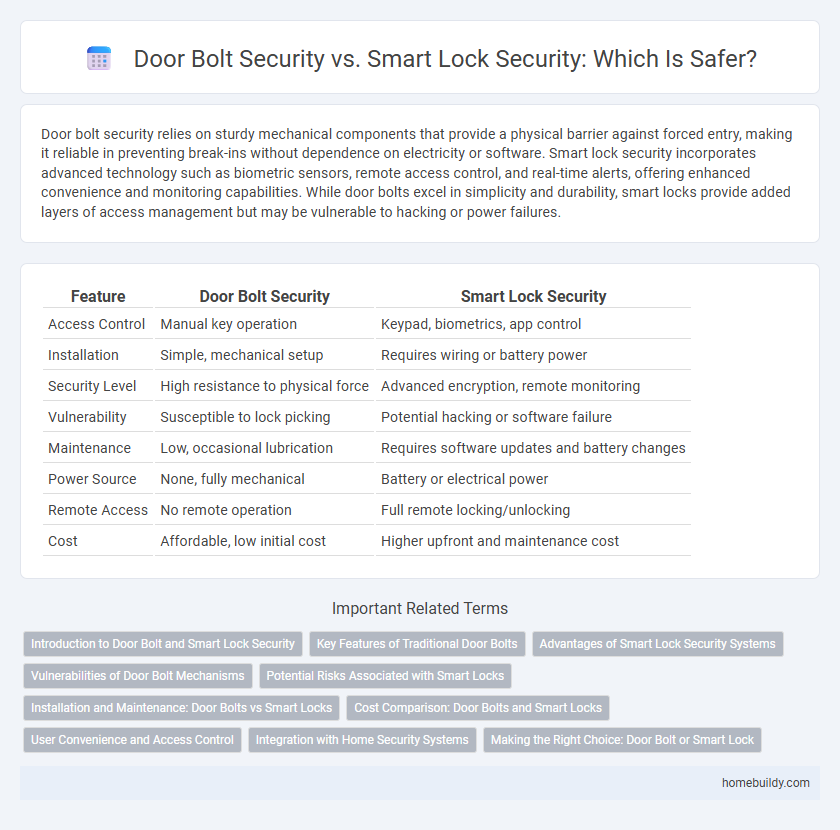Door bolt security relies on sturdy mechanical components that provide a physical barrier against forced entry, making it reliable in preventing break-ins without dependence on electricity or software. Smart lock security incorporates advanced technology such as biometric sensors, remote access control, and real-time alerts, offering enhanced convenience and monitoring capabilities. While door bolts excel in simplicity and durability, smart locks provide added layers of access management but may be vulnerable to hacking or power failures.
Table of Comparison
| Feature | Door Bolt Security | Smart Lock Security |
|---|---|---|
| Access Control | Manual key operation | Keypad, biometrics, app control |
| Installation | Simple, mechanical setup | Requires wiring or battery power |
| Security Level | High resistance to physical force | Advanced encryption, remote monitoring |
| Vulnerability | Susceptible to lock picking | Potential hacking or software failure |
| Maintenance | Low, occasional lubrication | Requires software updates and battery changes |
| Power Source | None, fully mechanical | Battery or electrical power |
| Remote Access | No remote operation | Full remote locking/unlocking |
| Cost | Affordable, low initial cost | Higher upfront and maintenance cost |
Introduction to Door Bolt and Smart Lock Security
Door bolts provide a sturdy mechanical barrier by physically securing the door with a solid metal latch, making them reliable for resisting forced entry. Smart locks enhance security through electronic access control, offering features like remote monitoring, keyless entry, and integration with home automation systems. Both systems improve door security, but smart locks deliver advanced functionality beyond traditional mechanical strength.
Key Features of Traditional Door Bolts
Traditional door bolts provide robust mechanical security with simple, durable materials such as steel or brass, offering reliable resistance against forced entry. Their key features include easy installation, manual operation without reliance on power or connectivity, and high physical strength to secure doors effectively. These bolts function independently of electronics, eliminating vulnerabilities to hacking or power failures common in smart locks.
Advantages of Smart Lock Security Systems
Smart lock security systems offer enhanced access control through remote management, biometric authentication, and real-time monitoring, surpassing traditional door bolt capabilities. Their integration with home automation platforms enables seamless user access customization and instant alerts, significantly reducing unauthorized entry risks. Unlike mechanical door bolts, smart locks provide audit trails and can be updated with new security features via software, ensuring adaptable protection against emerging threats.
Vulnerabilities of Door Bolt Mechanisms
Traditional door bolt mechanisms often face vulnerabilities such as susceptibility to lock picking, physical force attacks like prying or hammering, and wear over time that can reduce their effectiveness. Unlike smart locks, door bolts lack real-time tamper alerts and remote monitoring capabilities, making it easier for intruders to exploit unnoticed. Enhancing door bolt security may require integrating reinforced materials and supplementary protective features to mitigate these inherent weaknesses.
Potential Risks Associated with Smart Locks
Door bolt security relies on mechanical strength and simplicity, reducing vulnerabilities to hacking or software malfunctions commonly associated with smart locks. Smart locks, while offering convenience and remote access, present potential risks including cyber attacks, unauthorized access via hacking, and dependence on internet connectivity and power supply. These vulnerabilities highlight the importance of integrating robust encryption protocols and regular software updates to mitigate security breaches in smart lock systems.
Installation and Maintenance: Door Bolts vs Smart Locks
Door bolts offer a straightforward installation process requiring only basic tools and minimal wiring, making them accessible for most homeowners. Maintenance of door bolts typically involves simple lubrication and occasional tightening, ensuring long-term durability with little technical skill. In contrast, smart locks require professional or advanced DIY installation involving wiring or battery setup, and ongoing software updates plus battery replacements are essential for optimal security and functionality.
Cost Comparison: Door Bolts and Smart Locks
Door bolts offer a cost-effective security solution with prices typically ranging from $10 to $50, making them an affordable choice for basic door reinforcement. Smart locks, priced between $100 and $300, provide advanced features like remote access and integration with home automation systems but require higher initial investment and potential maintenance costs. For budget-conscious consumers prioritizing physical security without digital functionalities, door bolts present a lower-cost alternative to smart locks.
User Convenience and Access Control
Door bolts offer straightforward user convenience with manual locking and simple installation, ensuring consistent physical security without reliance on batteries or network connectivity. Smart locks provide enhanced access control through features like remote unlocking, user-specific codes, and activity logs, allowing for flexible management of entry permissions. While door bolts excel in reliability and ease of use, smart locks deliver advanced convenience through technology-driven access customization and real-time monitoring.
Integration with Home Security Systems
Door bolts provide robust mechanical security and can be easily integrated with traditional home security systems through sensor attachments, enhancing overall protection by triggering alarms when tampered with. Smart locks offer advanced integration capabilities with home automation platforms, allowing remote access control, real-time monitoring, and seamless syncing with security cameras and motion detectors. Both solutions improve home security, but smart locks deliver superior connectivity and customizable alerts within comprehensive security ecosystems.
Making the Right Choice: Door Bolt or Smart Lock
Door bolt security offers a reliable, mechanical solution with no reliance on batteries or network connectivity, making it less vulnerable to hacking or power failures. Smart lock security provides convenience through remote access, keyless entry, and integration with home automation systems, but may expose users to cybersecurity risks and technical malfunctions. Evaluating factors such as security needs, budget, ease of use, and the level of technology acceptance is essential for making the right choice between a door bolt and a smart lock.
Door bolt security vs smart lock security Infographic

 homebuildy.com
homebuildy.com